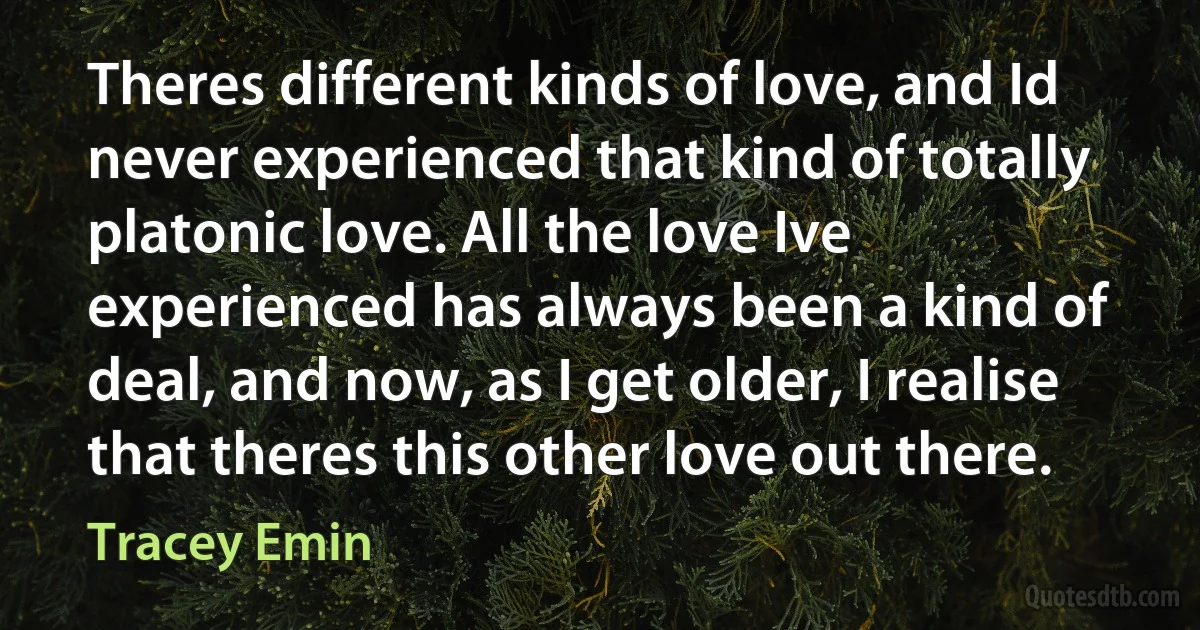Platonic Quotes - page 2
There is no author to whom my father thought himself more indebted for his own mental culture, than Plato, or whom he more frequently recommended to young student. I can bear similar testimony in regard to myself. The Socratic method, of which the Platonic dialogues are the chief example, is unsurpassed as a discipline for correcting the errors, and clearing up the confusions incident to the intellectus sibi permissus.

John Stuart Mill
The anxiety about death is met in two ways. The reality of death is excluded from daily life to the highest possible degree. The dead are not allowed to show that they are dead; they are transformed into a mask of the living. The other and more important way of dealing with death is the belief in a continuation of life after death, called the immortality of the soul. This is not a Christian and hardly a Platonic doctrine. Christianity speaks of resurrection and eternal life, Platonism of a participation of the soul in the transtemporal sphere of essences. But the modern idea of immortality means a continuous participation in the productive process.

Paul Tillich
The mark of Platonic philosophy is a radical dualism. The Platonic world is not one of unity; and the abyss which in many ways results from this bifurcation appears in innumerable forms. It is not one, but two worlds, which Plato sees when with the eyes of his soul he envisages a transcendent, spaceless, and timeless realm of the Idea, the thing-in-itself, the true, absolute reality of tranquil being, and when to this transcendent realm he opposes the spacetime sphere of his sensuous perception-a sphere of becoming in motion, which he considers to be only a domain of illusory semblance, a realm which in reality is not-being.

Hans Kelsen
In the Platonic dialectic, ... the terms "Being” "Non-being” "Movement,” "the One and the Many” "Identity” and "Contradiction” are methodically kept open, ambiguous, not fully defined. They have an open horizon, an entire universe of meaning which is gradually structured in the process of communication itself, but which is never closed. The propositions are submitted, developed, and tested in a dialogue, in which the partner is led to question the normally unquestioned universe of experience and speech, and to enter a new dimension of discourse - otherwise he is free and the discourse is addressed to his freedom. He is supposed to go beyond that which is given to him - as the speaker, in his proposition, goes beyond the initial setting of the terms. These terms have many meanings because the conditions to which they refer have many sides, implications, and effects which cannot be insulated and stabilized.

Herbert Marcuse
Two conflicting types of educational systems spring from these conflicting aims. One is public and common to many, the other private and domestic. If you wish to know what is meant by public education, read Plato's Republic. Those who merely judge books by their titles take this for a treatise on politics, but it is the finest treatise on education ever written. In popular estimation the Platonic Institute stands for all that is fanciful and unreal. For my own part I should have thought the system of Lycurgus far more impracticable had he merely committed it to writing. Plato only sought to purge man's heart; Lycurgus turned it from its natural course. The public institute does not and cannot exist, for there is neither country nor patriot. The very words should be struck out of our language. The reason does not concern us at present, so that though I know it I refrain from stating it.

Jean-Jacques Rousseau
I am an artist, and, through my eye, must confess to a tremendous bias. In my purely literary voyages my eye is always my compass. "The architectural simplicity” – whether of a platonic idea or greek temple – I far prefer to no idea at all, or no temple at all, or, for instance, to most of the complicated and too tropical structures of India. Nothing could ever convince my EYE – even if my intelligence were otherwise overcome – that anything that did not possess this simplicity, conceptual quality, hard exact outline, grand architectural proportion, was the greatest art. Bergson is indeed the arch enemy of every impulse having its seat in the apparatus of vision, and requiring a concrete world. Bergson is the enemy of the Eye, from the start; though he might arrive at some emotional compromise with the Ear. But I can hardly imagine any way in which he is not against every form of intelligent life. (p. 338)

Wyndham Lewis
I think [my experience] gave me-without I think ever romanticizing (because these were people you romanticize as somehow super people), it gave me a very deep and lasting respect for the common sense and the abilities of human beings, adults. At the same time, it increased my awareness of the importance of information and the challenge that that posed, therefore the challenge of education. And the great gap between what people need to know in order to protect their own self-interest and what they do know, which of course in some Platonic and other theories is filled in by those who believe that they know best, a view which as you know I've always greatly distrusted.

Robert A. Dahl
But Hermotimus, the Colophonian, rendered more abundant what was formerly published by Eudoxus and Theætetus, and invented a multitude of elements, and wrote concerning some geometrical places. But Philippus the Mendæan, a disciple of Plato, and by him inflamed in the mathematical disciplines, both composed questions, according to the institutions of Plato, and proposed as the object of his enquiry whatever he thought conduced to the Platonic philosophy.

Proclus
The Platonic doctrine of Ideas has been, in all ages, the derision of the vulgar, and the admiration of the wife. Indeed, if we consider that ideas are the most sublime objects of speculation, and that their nature is no less bright in itself, than difficult to investigate, this opposition in the conduct of mankind will be natural and necessary; for, from our connection with a material nature, our intellectual eye, previous to the irradiations of science, is as ill adapted to objects the most splendid of all, "as the eyes of bats to the light of day."

Proclus
Hellenic science is a victory of rationalism, which appears greater, not smaller, when one is made to realize that it had been won in spite of the irrational beliefs of the Greek people; all in all, it was a triumph of reason in the face of unreason. Some knowledge of Greek superstitions is needed not only for a proper appreciation of that triumph but also for the justification of occasional failures, such as the many Platonic aberrations.

George Sarton
The protracted struggle which dragged on in Egypt was not a conflict of visions, but the conflict between a vision of freedom, the "eternal" Platonic Idea of Freedom, and a blind clinging to power ready to use all means possible- terror, food deprivation, exhaustion, bribery- to crush the will to freedom.

Slavoj Žižek
In order to understand the Freudian concepts, one must set out on the basis that it is the subject who is called-the subject of Cartesian origin. This basis gives its true function to what, in analysis, is called recollection or remembering. Recollection is not Platonic reminiscence -it is not the return of a form, an imprint, a eidos of beauty and good,a supreme truth, coming to us from the beyond. It is something that comes to us from the structural necessities, something humble, born at the level of the lowest encounters and of all the talking crowd that precedes us, at the level of the structure of the signifier, of the languages spoken in a stuttering, stumbling way, but which cannot elude constraints whose echoes, model, style can be found, curiously enough, in contemporary mathematics.

Jacques Lacan
One of Nietzsche's most important legacies to us ... is his claim that it is desirable and possible to dismantle the Platonic apparatus of Forms, Absolute Truth, the Idea of the Good, etc. and its historical derivatives, such as Kant's transcendental philosophy, and that this can be done without fear of falling into "relativism.”.

Raymond Geuss
The war [World War 1. ] gave me a certainty of belief. I grew aware of the bankruptcy of theories, of the theories of intellectuals as well as artists. L'art pour l'art and other grave problems no longer gave me a headache; they seemed to me so much bosh hand interested me as little as platonic love.

Maurice de Vlaminck
The heterodox current in Judaism led by Jesus seems to have had no notion of an immortal soul, created by God and then infused into the body: immortality meant being raised from the dead in the body one had in life, then living for ever in a world without decay or corruption. In the Christian religion invented by Paul and Augustine, which was strongly influenced by Plato, immortality meant something quite different – a life out of time, enjoyed by the ‘soul' or ‘spirit' of the departed. How this Platonic immortality could preserve anything like the persons that once lived was not made clear.

John N. Gray
Since it is always the same person whose mind thinks, wills, and judges, the autonomous nature of these activities has created great difficulties. Reason's inability to move the will, plus the fact that thinking can only "understand” what is past what neither remove it nor "rejuvenate it” ... have led to the various doctrines asserting the mind's impotence and the force of the irrational, in brief to Hume's famous dictum that "Reason is and ought only to be the slave of the passions,” that is, to a rather simple-minded reversal of the Platonic notion of reason's uncontested rulership in the household of the soul. What is so remarkable in all these theories and doctrines is their implicit monism, the claim that behind the obvious multiplicity of the world's appearances and, even more pertinently to our context, behind the obvious plurality of man's faculties and abilities, there must exist a oneness - the old hen pan, "the all is one”.

Hannah Arendt
"Is it agreeable?" somebody asked.
"Neither agreeable nor disagreeable," I answered. "it just is." Istigkeit - wasn't that the word Meister Eckhart liked to use? "Is-ness." The Being of Platonic philosophy - except that Plato seems to have made the enormous, the grotesque mistake of separating Being from becoming and identifying it with the mathematical abstraction of the Idea. He could never, poor fellow, have seen a bunch of flowers shining with their own inner light and all but quivering under the pressure of the significance with which they were charged; could never have perceived that what rose and iris and carnation so intensely signified was nothing more, and nothing less, than what they were - a transience that was yet eternal life, a perpetual perishing that was at the same time pure Being, a bundle of minute, unique particulars in which, by some unspeakable and yet self-evident paradox, was to be seen the divine source of all existence.

Aldous Huxley



